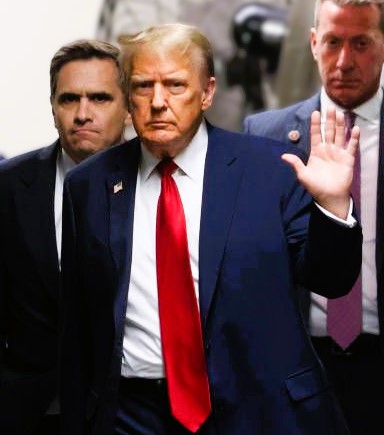
As the 2024 presidential election heats up, Donald Trump finds himself in a unique position ahead of tonight’s debate. Having been a dominant figure in the GOP for years, his presence, demeanor, and policies are well known. However, there are striking similarities to Joe Biden’s situation in the Democratic debates that could spell trouble for Trump. If Trump encounters the same challenges Biden faced in his debates, it could potentially alter the course of the Republican Party’s strategy and unity. Here are five ways Trump’s debate performance could mirror Biden’s past struggles and how his party might react.
1. Struggles with Age-Related Criticism
Both Donald Trump and Biden are in their late 70s, making age a central point of discussion. During Biden’s debates, his age and occasional lapses in speech were targets for criticism, raising concerns about his fitness for the presidency. Trump, who has often ridiculed Biden for such gaffes, may now find himself facing similar scrutiny. If he struggles to deliver sharp, clear, and concise arguments, his opponents may seize on this as evidence of decline, echoing the criticism Biden endured.
How the GOP reacts to this will be key. Some Republicans may dismiss these concerns as media-driven narratives, while others might quietly question whether the party should continue to rally behind an aging candidate. If Donald Trump falters, his competitors could use it as an opportunity to position themselves as more vibrant alternatives, forcing the party to reconsider its commitment to Trump.
2. Policy Gaps and Evasions
Biden was occasionally criticized during debates for being vague or evasive on policy specifics, a tactic that frustrated both his opponents and voters. Donald Trump, known for his broad strokes and reliance on slogans like “Make America Great Again,” might fall into a similar trap. If he fails to provide detailed policy answers—especially on pressing issues like inflation, foreign relations, or healthcare—he could appear out of touch or unprepared.
The Republican base, known for its loyalty to Donald Trump, may still rally behind him, but more moderate and undecided voters might feel disillusioned. GOP leaders will need to decide whether to continue backing a candidate who struggles to articulate a forward-looking policy agenda, or shift support to candidates like Ron DeSantis or Nikki Haley, who are seen as more policy-driven.
3. Facing Tough Opposition from Within
Just as Biden faced stiff competition from within his party, particularly from younger and more progressive candidates like Bernie Sanders and Elizabeth Warren, Trump will have to fend off rising stars in the GOP. If these candidates, like DeSantis or Tim Scott, outperform Trump on stage, it could signal a generational shift within the party.
Republicans might be forced to confront an internal identity crisis. Do they continue to back the populism that Donald Trump championed, or do they gravitate toward a new leader with fresh ideas? A strong performance by one of Trump’s rivals could spark discussions about the future of the GOP and whether it’s time to pass the torch to a new generation.
4. Dealing with Controversies
Biden faced questions during debates about his son Hunter Biden and potential conflicts of interest. Trump, who is no stranger to controversy, might find himself similarly cornered on stage. With ongoing legal battles, including indictments and investigations, his competitors could turn the spotlight on these issues to undermine his campaign.
If Donald Trump struggles to adequately address these controversies or comes off as defensive, it could raise doubts among voters about his electability in a general election. Republican leadership may have to assess whether Trump’s legal woes make him too much of a liability, especially with swing voters who are critical to winning the White House.
5. Balancing Experience with a Vision for the Future
Biden often leaned on his experience during debates, touting his years in the Senate and as vice president. Trump will likely emphasize his time as president and the successes of his administration. However, the challenge will be balancing this experience with a clear vision for the future. If Trump focuses too much on past victories, he may risk alienating voters who are more interested in forward-thinking solutions.
Should Donald Trump fail to outline a compelling vision for his second term, the Republican Party may start to question whether he is the right candidate to lead the party into the future. A clear, progressive agenda from one of his rivals could push party members to reconsider their stance and shift their loyalty toward a candidate who embodies a more dynamic, future-oriented approach.
Conclusion: How the GOP Might React
If Donald Trump faces these challenges during tonight’s debate, the reaction from his party could be mixed. His core supporters are likely to remain loyal, but there could be increasing pressure from party elites and donors to consider alternatives. The GOP’s future may hinge on how its leadership responds to a potential debate performance that mirrors Biden’s earlier struggles. Will they double down on Trump, or begin to seriously consider a new face to lead the party into the next election? The answer may unfold in the days following tonight’s debate.